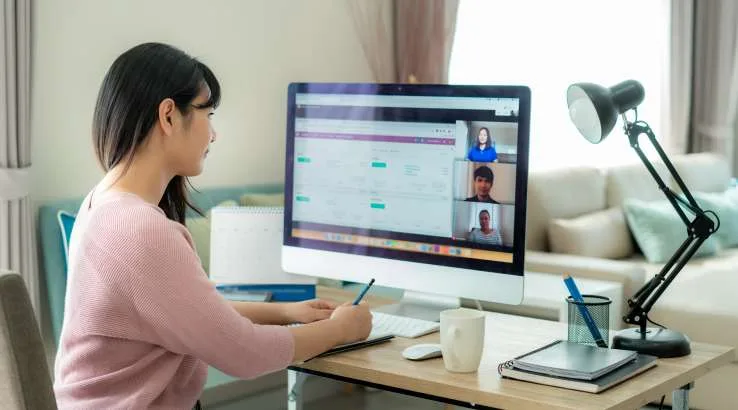How to work at home as effectively as at the office

Tried-and-tested techniques to be the boss of your home office
Having the right technology is essential for working at home, but technology alone isn't enough. Workplace research shows that you need to adopt a clear strategy to ensure you remain productive. Here's what to do.
 This guide is sponsored by Telstra mobile broadband, keeping you connected during COVID-19 with extra data, bill assistance and discounts. Work from home on Australia's largest and fastest network, based on national average speeds. No lock-in data plans, no excess data charges and a range of devices to choose from.
This guide is sponsored by Telstra mobile broadband, keeping you connected during COVID-19 with extra data, bill assistance and discounts. Work from home on Australia's largest and fastest network, based on national average speeds. No lock-in data plans, no excess data charges and a range of devices to choose from.1. Treat work like work

Sure, as the days get colder it's tempting to stay in your pyjamas and dressing gown and just sit down at your laptop. But that's a bad idea even before you consider how you'll look during video calls.
Getting dressed sets a clear boundary between when you're "at home" and when you're "at work", so dress as you usually would. That's especially important if you don't have the advantage of a separate room to work in. You need something to signify the difference between working at the dining room table and eating dinner.
2. Maintain regular communication with your team

Working remotely eliminates one of the hidden benefits of a regular workplace: being able to call across the room to your colleagues for instant input, or asking the person sitting next to you for help. When you can't rely on casual communication, you need to plan for it.
You can't have a daily in-person stand-up meeting with your team, but you can still have a virtual meeting via video chat. Keep regular meetings going, even if the format is now somewhat different. Used walking meetings before? Pop a Bluetooth headset on and maintain the tradition.
3. Reshape your day

With that said, take advantage of the fact that you're no longer commuting and reshape your schedule to suit. If you're now starting at 7:30am instead of 9am, make sure you finish earlier too. If you previously headed to the gym after work, switch to taking an extra hour at lunch so you can be outdoors in the daylight. And if you need to schedule awkward meetings with overseas colleagues late at night, it's easier to sleep in the next day.
If you're working from home and looking after or educating kids, a shift-based approach can really help. For instance, Tony-winning actress Laura Benanti spends 8am to 1pm with her children, then her husband takes over from 1pm to 5pm.
4. Learn all the software tricks and tips

In a remote environment, you're much more reliant on email, text and video chat. To avoid feeling overwhelmed, make sure you're taking advantage of all the features your software offers.
These are the three simple changes I made working remotely that have really made a difference:
- In Slack, I've starred my key chat channels (and my immediate manager), so I can see if there are new and critical messages. That makes it easy to identify high-priority issues that will need a response. Everything else waits until I've finished what I'm currently working on.
- In Gmail, I set up filters to automatically archive messages that are purely informational, such as status updates from our JIRA project management platform. They're still there if I do a search, but they're not in my face as soon as they arrive.
- In Zoom, I changed my preferences so that audio calls connect automatically, rather than asking each time which microphone I want to use. It's a simple tweak but it makes calls go much more smoothly.
Every workplace uses a different combination of technologies. If you find a useful fix like the ones above, share it with your team! (That's how I learned about the Zoom option.)
5. Remember to switch off

With no train to catch or office door to shut, it can be easy to work much longer hours than you normally do. In my first week of full-time remote working, I pulled three 12-hour days. That's not sustainable or sensible.
Work/life balance is always challenging, and remote working really blurs the boundaries. Take time to stay healthy with regular exercise and don't let work consume all your waking hours.
6. It's OK to stumble

No-one is productive 100% of the time, and everyone's work style is different. So don't beat yourself up if working from home feels like a challenge sometimes. That's absolutely normal.
Academic research clearly shows remote work is not ideal for everybody. In one study, 50% of people trying out remote work switched back to working in the office when given the choice. Other research suggests working from home can disrupt your sleep patterns.
The bottom line? Some days will be better than others. Accept it and move on to the next day.
Pictures: Shutterstock
Compare mobile broadband plans from Telstra
Or compare other mobile broadband plans here
Compare other products
We currently don't have that product, but here are others to consider:
How we picked theseLatest headlines
-
All the big savings account interest rate rises: ING, AMP, Westpac + more
6 Feb 2026 |
-
Australian credit card debt soars 10% in a year: How can you escape the trap?
6 Feb 2026 |
-
4 cashback home loan offers to ease the pain of RBA rate hike
4 Feb 2026 |
-
Finder’s RBA Survey: Easing cycle ends as RBA delivers first rate hike since 2023
4 Feb 2026 |
-
Ubank Save is increasing its bonus rate up to 5.35% p.a.
3 Feb 2026 |
